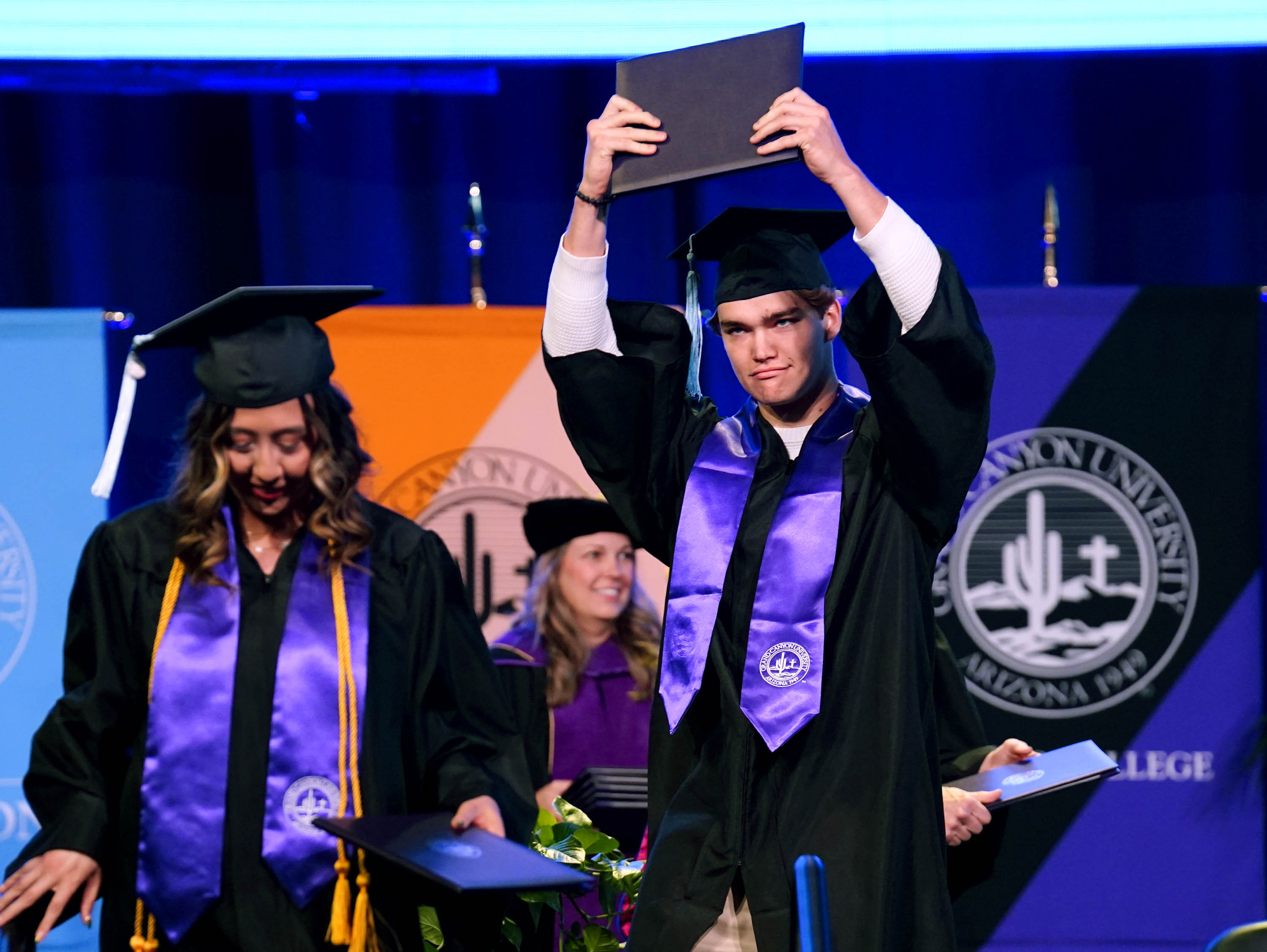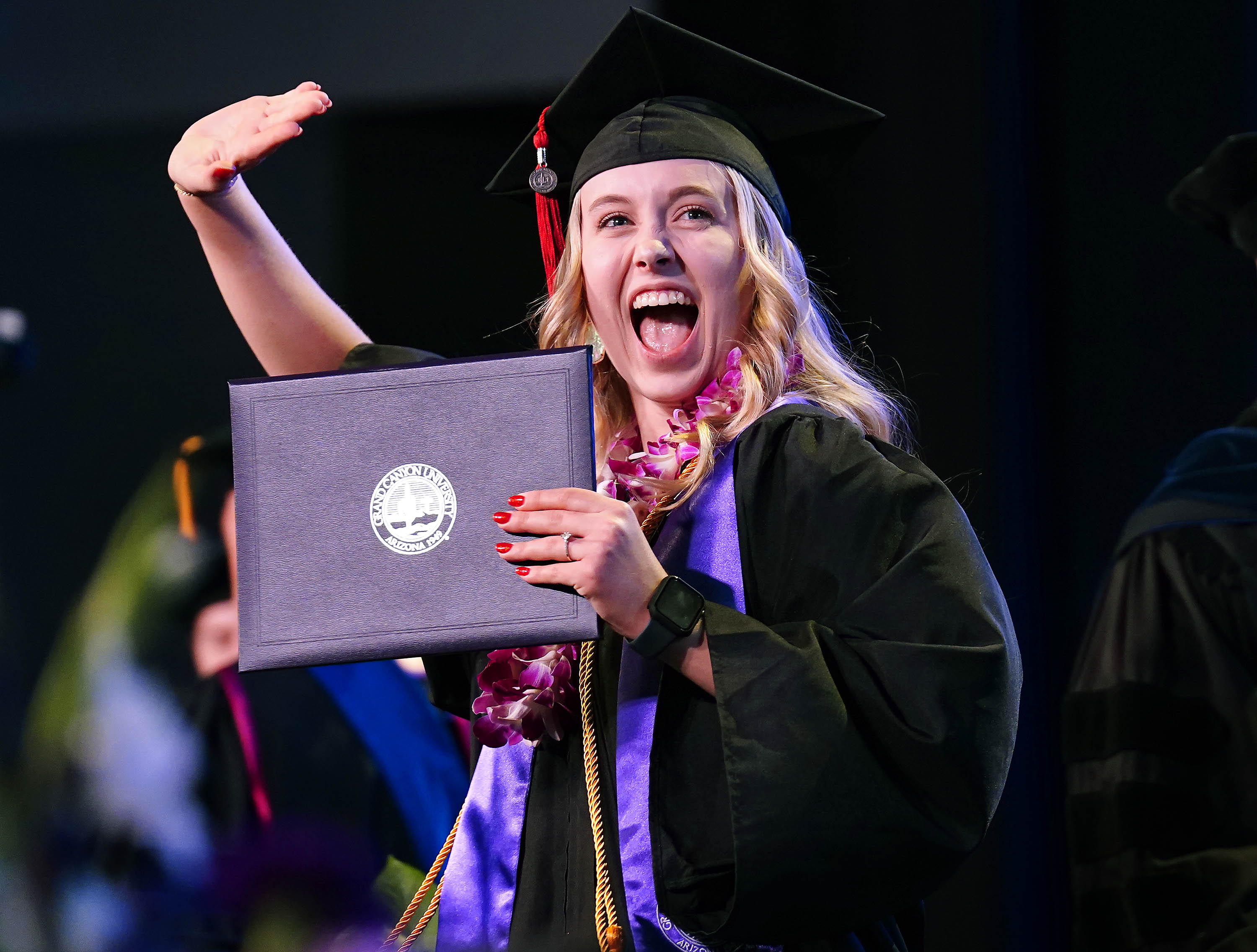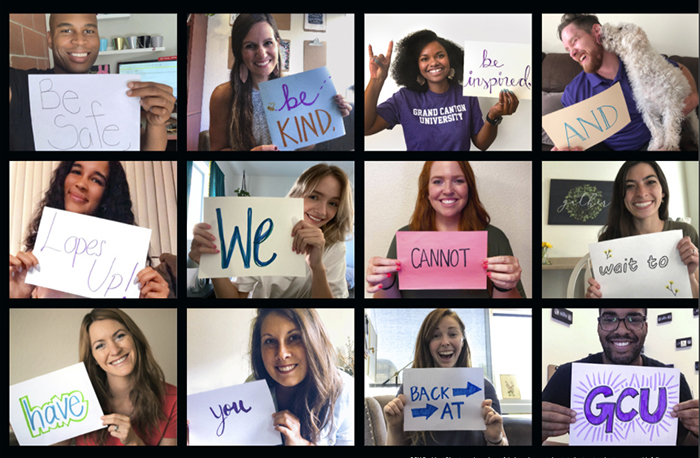
Editor's note: Reprinted from the August 2020 issue of GCU Magazine. To read the digital version, click here.
By Rick Vacek
Contributing: Lana Sweeten-Shults, Mike Kilen, Ashlee Larrison
GCU Magazine
“We’re trying to be part of the solution.”
When Grand Canyon University President Brian Mueller uttered those words in yet another of the twice-a-week task force meetings that were in their fourth month, University leaders had just made a pivotal decision in the face of a dangerous spike of the COVID-19 pandemic in Arizona.
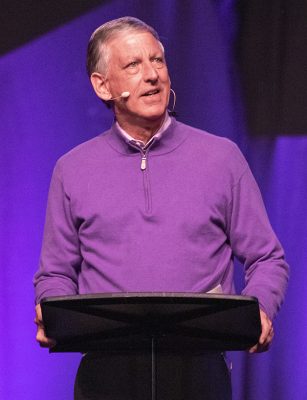
Even though it was mid-July, even though it would require major last-minute adjustments to the fall semester schedule, they would delay the start of ground classes until Sept. 8 and then conduct them online for three weeks before bringing students onto campus.
Mueller’s message was clear:
You pivot for safety.
Safety means sacrifice.
It’s the only way for a Christian university.
“Every person and every organization has to say, ‘Are we going to be part of the problem or part of the solution?’” he said later. “And if we can get everybody saying, ‘We’re going to part of the solution and are willing to make the sacrifices to do that,’ we’re going to end this thing sooner rather than later and minimize its impact.
“As a Christian community, we had to especially take into account our role in being part of the solution.”
Even when the solution costs money. Not only did GCU pro-rate housing costs for students arriving after Sept. 20, it plans on using the entire $22.3 million it was allotted in CARES Act funds to benefit students and to help absorb costs related to the disruption of campus operations caused by COVID-19.
It also expects to spend in excess of $7 million more in the fall semester by hiring additional faculty and instructional assistants, adding more mental health counselors and nurses at the Health and Wellness Clinic, investing in testing procedures and sanitization supplies, and converting GCU Hotel into a facility that can isolate or quarantine individuals in order to provide care and food for them.
“We never based decisions on what was financially best for the University. It was always based on the best possible experience for students and the safest possible experience,” Mueller said.

Not long before the 11th-hour decision, the plan was for students to return to campus in August, as usual. Everyone knew that predicting this pandemic is like planning for the unplannable, but the sudden uptick in positive tests still was unnerving.
“Arizona literally went from one of the safest places in the world to being one of the most dangerous places in the world in a period of 30 to 40 days,” Mueller said. “Nobody in the world faced as dramatic an adjustment as we did.”
But if there is one thing he has learned in his 12 years at GCU, it’s that he has a team that can adjust on the fly. From the faculty to the operational staff, no one quaked in reacting to this seismic shift.
“Almost every group was impacted,” he said. “It was the total cooperation and willingness of people to work together to get behind this plan.” It was all about solutions – safe solutions – and not just for students. The health of faculty and staff was a critical factor, too.
“Safety is first and foremost in every discussion that we have about this,” said Claude Pensis, Dean of the College of Fine Arts and Production (COFAP), “and I think that says a lot about the institution and about the leadership at the institution.”
Here’s how that leadership worked tirelessly across the spring and summer, averaging at least 25 to 30 Zoom meetings a week in many cases, to make some of the most difficult decisions of their careers. It’s a story as dramatic as the virus itself, and it focuses on one central theme:
They care. Boy, do they care. And they’re betting on the campus community to focus its culture of caring on battling the virus. It’s the GCU way.
Anatomy of a crisis
Dr. Crystal McCabe, Associate Professor in the College of Education, will never forget the moment everything changed.
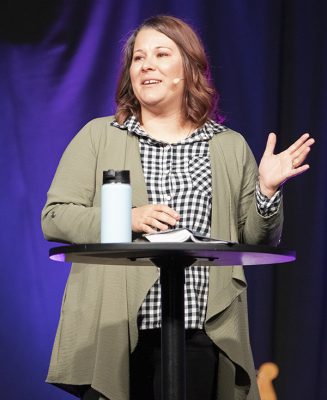
She was speaking at a conference for a Christian high school in South Dakota in the second week of March. In preparation the night before, “for no rhyme or reason, I just threw in” information on virtual strategies that educators could use, such as Zoom, Loom and Flipgrid.
During the presentation the next day, the school’s principal was called out of the room to announce that students and staff would be going home because of the pandemic.
“These teachers had no experience (in remote learning). So all the strategies we added that night became real strategies they needed,” McCabe said. “It was a God thing.”
The scene at the Western Athletic Conference Basketball Tournament in Las Vegas was even more chilling. As the game involving the GCU women’s team was about to start, fans were told to evacuate the arena because of concerns about the virus.
Danielle Rinnier, Assistant Dean of Students, had just driven there to watch the Lopes play. Now she was heading right back home to uncertainty and, undoubtedly, a lot of meetings.
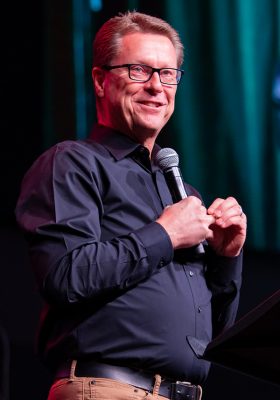
“It feels like from that moment, there was going to be a significant change in culture and response that needed to happen because of the gravity of the situation,” she said.
She recalls an overriding theme of those early meetings:
“We’ve never done this before. How do we serve students, keep staff safe and respond appropriately?”
Like most people back then, Dr. Tim Griffin didn’t know what to make of COVID-19. Sure, it was going to be unlike anything our 21st-century world has ever known, but how long would it last?
“There was great optimism then, especially in Arizona, that we’d get a handle on this pretty quick,” GCU’s Pastor and Dean of Students said. “Then New York blew up. In Arizona, there was a real delayed effect.”
But some of Griffin’s family members are in nursing, and they told him of studies indicating that the virus wouldn’t peak in Arizona until mid-July.
“Through all those months, that was in the back of my mind,” he said. “I didn’t get overly optimistic.”
Meetings ramped up
When students were sent home for spring break and told to remain there for the remainder of the spring semester, campus leaders already were deep into COVID-19 planning.
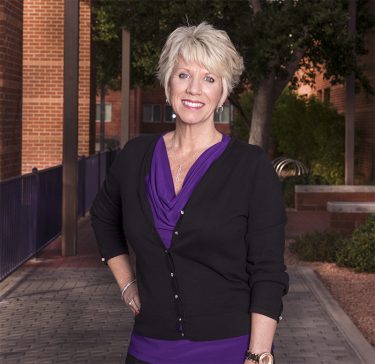
A task force was formed with more than 100 individuals representing every department at GCU. Soon, that army of thinkers would break into 11 subcommittees – from an academic committee to an events committee to a fine arts and athletics committee – all of which were dedicated to one thing: safety.
“We realized early on that one size doesn’t fit all; we needed the expertise and recommendations of each subcommittee,” said Dr. Lisa Smith, Dean of the College of Nursing and Health Care Professions.
Mueller also sought input from parents and students and shared those feelings with the task force.
“He realizes everyone has a different lens,” Smith said, and he wants to see through all those lenses.

Mueller leaned heavily on Connie Colbert, Director of the Canyon Health and Wellness Clinic, Marcus Castle, GCU’s Emergency Preparedness Manager, and Smith to provide their health and safety expertise to the task force.
“Marcus, Connie and I spent a lot of time together – a lot of time,” Smith said. “We would meet and talk through that week’s discussion, and then we would take that discussion to the larger group and say, ‘Here’s what we talked about, what do you all think as a group?’ There were days where we would be calling or Zooming multiple times a day just because of how things were rapidly changing.”
The trio would prove crucial in helping campus leaders understand the virus and strategize their response to it.
“Those three are phenomenal,” said Dr. Randy Gibb, Dean of the Colangelo College of Business. “That’s my biggest takeaway – we have an amazing team of subject-matter experts who are passionate and articulate in sharing their thoughts, their concerns and then coming up with an action plan to make it happen.”
Prepared for turbulence
Gibb is a 26-year veteran of operational U.S. Air Force leadership and academic administration, so he knows a thing or two about flying difficult missions. When asked what the last few months have been like, he thought back to something he used to teach fighter pilots: Plan the flight, fly the plan.

“We tried to plan the flight,” he said. “Well, guess what? When you’re airborne, things change. You’ve got to adapt. In a sense, that’s what happened. We had a plan and then we had to change.
“The other famous saying in the Air Force is, ‘Flexibility is the key to airpower.’ That’s what I lived and breathed for 26 years. That’s what we’re having to do in our society, let alone higher education.”
Even as more than 90% of GCU and Grand Canyon Education employees worked from home while they planned the flight that is the mission to slow the spread of COVID, they continued to come together – for students, for each other, for the community.
Canyon Promotions launched an initiative to make cloth face masks from unused T-shirts. The College of Science, Engineering and Technology used its 3D printers to make face shields, many of which were donated to first responders. Employees from COFAP, Public Safety and University Event Services jumped in to help.
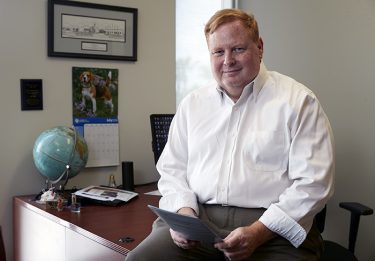
When employees were asked to contribute to a fundraiser in support of those efforts, online donors nearly doubled the goal and raised almost $60,000 in just two weeks. Additional donations from GCU and Grand Canyon Education brought the total to more than $150,000.
Caring. It all comes down to caring. For Dr. Sherman Elliott, Dean of the College of Humanities and Social Sciences, it all comes down to the Latin phrase cura personalis, or “care for the whole person,” and it’s the foundation of his meetings with administrators in his college.
“No matter what, no matter how stressed I am, no matter how much we have to hurry to meet a deadline, the first 10 minutes of that call is always, ‘How are you doing? How is your family doing?’” he said. “I look at it from a ministerial perspective. It’s my job to minister to them.”

And it’s GCU’s job to minister to students in the most thoughtful of ways, which is why the on-campus experience has to be different this fall. The most important change for students will be in the classroom, where blended learning – a mix of in person and online instruction – will be the norm.
What is blended learning? For starters, it’s something GCU has been doing for six years.
“It’s maximizing active learning strategies where it’s not a ‘sage on a stage,’” said Dr. Hank Radda, the University Provost. “It’s really getting students to engage in their learning. That happens in the classroom face to face, but it also happens in the interaction with the materials in the learning management system, the reading, the writing, the discussion.
“It’s really maximizing the best of both worlds in a very thoughtful way to get to the learning outcome. It’s a very powerful model, and we have significant experience with it with thousands of students over the past six years. It’s not something we just dreamt up today.”
Parent Council is on board
Plans for blended learning this fall already were in place when Arizona suddenly became a COVID hotspot. At Mueller’s spring meeting with the GCU Parent Council, the nationwide 15-member unit was unanimous in its desire to have students return to campus on time. But after the daily coronavirus numbers became more gruesome, the tone at the next meeting was more cautious.
“There’s a concern for the health of your children, but at the Parent Council level there also was a concern for the health of faculty and staff, said Jason Damkoehler of Bloomington, Ill., who’s on the council along with his wife, Nancy.
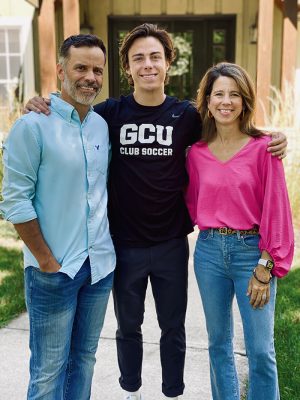
The council was relieved to learn of the new plan to start late and online. But Jason Damkoehler, who has been a pastor for two decades, saw the spiritual side of GCU’s process, too.
“There are a lot of universities out there making business-centric decisions, but this felt like a very Spirit-centric decision,” he said. “It was wisdom-based, not fear-based. It wasn’t, ‘How can we make sure the University can get its money?’ It was, ‘How can we ensure that our students and faculty and staff are protected and yet still fulfill our mandate to educate in the very best way possible?’
“I believe Nancy and I can speak for the entire Parent Council saying that really was the predominant feeling that we had.”
Nancy had another reason for being happy: She has been having so much fun with her children – including son Clay, an engineering major at GCU – during these months of stay-at-home-and-stay-safe.
“I don’t know if I’m different, but I really, really like my young adult children,” she said. “I don’t just love them, I like them. We have a blast together.”
The feeling is similar on the Parent Council. Jason and Nancy both talked of how its members become close right away during their two-year stints. “I think the Parent Council is a microcosm of the GCU community at large,” Jason said. Now that he has seen that community in action in the face of a major challenge, he’s that much more impressed.
“One of the things that attracted me to Grand Canyon University,” he said, “is the partnership with the Holy Spirit. The Bible says, ‘Humble thyself in the sight of the Lord, and He will lift you up.’ I think that applies to people and I think that applies to churches and I think that applies to any Christian organization.
“GCU is an incredible institution, and I believe it’s because they humble themselves and say, ‘Jesus, what do you want us to do next?’ And then they actually listen.”
All in for the fall
So what will happen this fall? Universities across the country are expected to reopen, and it’s only natural for everyone to hold their breath and hope that physical distancing becomes natural, too.
GCU has a major advantage: The warm Arizona weather will allow students to stay outside – where the virus is less likely to spread – through November and beyond, and extra shading will be constructed all over campus to encourage them to eat outside, play outside, even go to class outside.
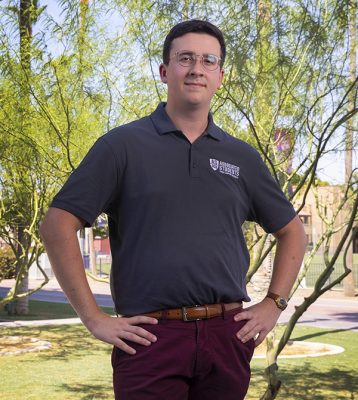
“It’s going to be on the students to own keeping distance between people they don’t live with or aren’t familiar with out of respect for their health,” Griffin said. “It is going to be a culture-building piece.”
Dylan Mahoney, President of the Associated Students of GCU, is charged with helping build that culture: “We need to be somebody that supports the student body and listens because this is a new frontier we are going into. We have never had such a large-scale issue that ASGCU had to deal with. It’s going to be scary and exciting.”
That sense of excitement and discovery has been a constant through all the COVID-related conversations, which continued unabated through the summer – no breaks. Some of the changes this fall, such as a later start to the academic year, might be adopted permanently if they work well.
But there’s one thing that won’t change at GCU: the Christian spirit. It keeps coming up in all those meetings.
“It’s the Christian foundation, loving God with all your heart, soul and mind and loving your neighbor as yourself, which is the most difficult thing in life to do,” Mueller said. “We’re not wired that way. But the Christian communities have been transformed and given the power to operate that way.”
It all starts there. And for University decision makers, it all starts with Mueller.
“With Brian’s leadership, we’re able to tackle things that we never thought we would have to tackle,” Radda said. “We’re learning things about ourselves as an organization, our faculty, our systems that we wouldn’t have thought of before. We’ve really dug deeper into what is our human capacity, what’s our technological capacity and how much we could change.”
And, above all else, how much they care.
Contact Rick Vacek at (602) 639-8203 or [email protected].
****
Related content:
GCU.edu: Modified timeline for fall semester
GCU Today: Employees' PPE assistance is multi-dimensional
GCU Today: GCU, GCE employees nearly double fundraising goal

